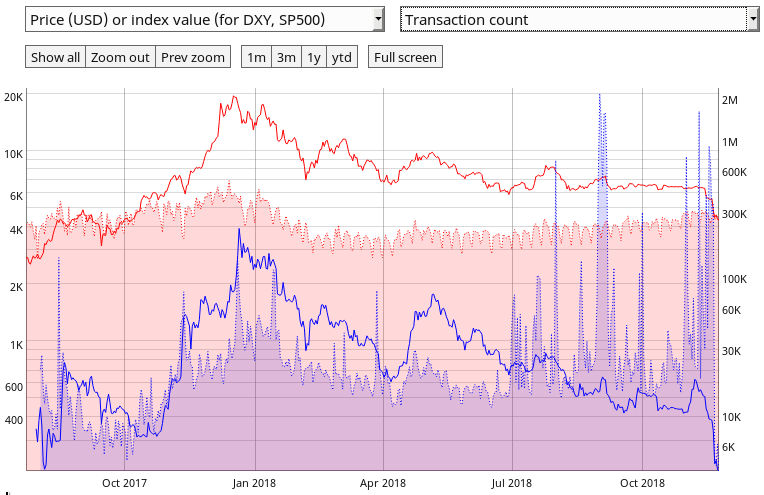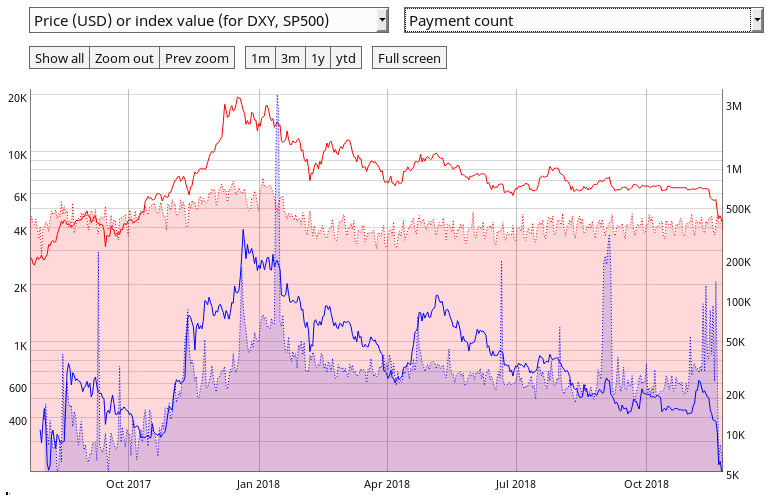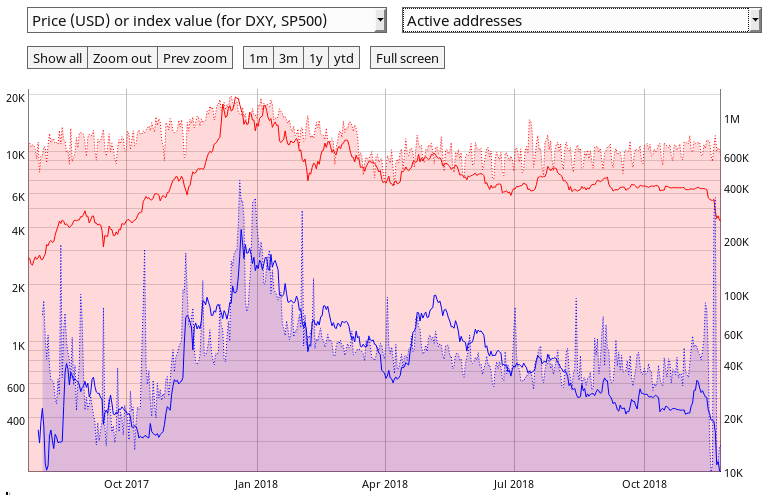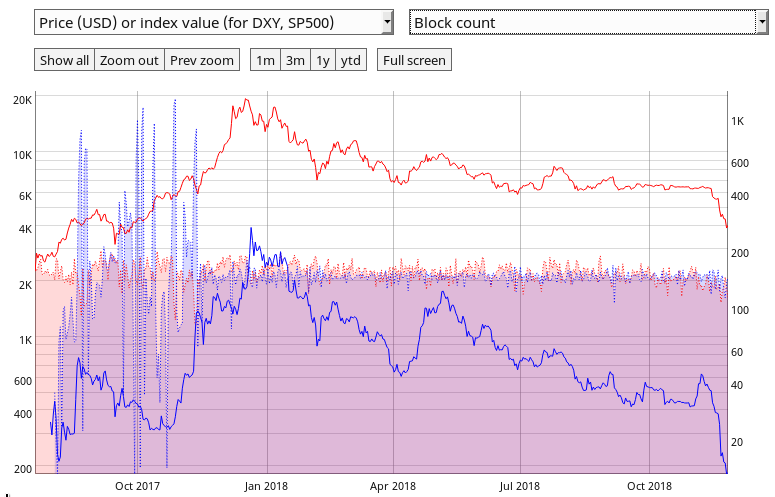Latest news about Bitcoin and all cryptocurrencies. Your daily crypto news habit.
 BCash chain split in brief
BCash chain split in brief
Recently and inevitably, the primary sponsors of BCash (self proclaimed ‘Bitcoin Cash’), Roger Ver, Jihan Wu, and Craig Wright (Faketoshi) have digressed to new all time lows (ATL) on their very-public and self-imposed paths to oblivion.
Roger Ver, along with Jihan Wu and company, have seized (bought?) apparent ownership of the BCH ticker acronym — as the majority of the largest exchanges (those still listing BCH at all: more later) are granting the ‘BCH’ acronym to their chain. Meanwhile, Faketoshi has split off BCH with a hard fork BSV. Fun fact: many misinterpret the acronym to stand for Bitcoin Satoshi’s Vision, when in reality it stands for Bull Shit Vision.
Honestly, I don’t care to go into any more detail on the matter here, as I quite simply don’t give two shits about the politics of scamcoins nor the spats between their infighting scam masters. And politics is precisely what BCH has always been about: Is the failed politician, criminal, expat Roger Ver the real Jesus? Is the blowhard, attention-whore, wanna-be the real Satoshi? What will be Mr. Wu’s next failed attempt to hijack the entire network? Sorry, I just don’t fucking care! But for those drama-whores: get your fix here.
As far as the supposed technical disputes go: does it really matter if the block size is 32MB or 128MB when both are not only ridiculous, but destructive to the network? Enough said.
Dropping of bags
It is very telling that the vast majority of exchanges didn’t even bother to add support for BSV in the first place and are dropping their support and listings of BCH like the bag-o-shit it is. Apparently, no one wants to be the last one holding the bags-o-shit; go figure. But is BCH really that bad? Yes. It’s own metrics are writing on the wall (in shit finger-paint, I’ve been told) of the demise of the BCash crock-chain and its associated sub-forks.
Bags of droppings
Because exchanges and metric analysis sources have completely ignored its launch, little to no data is available for BSV — want to waste your precious time investigating, be my guest.
As for the main BCH chain, the following figures tell a story of plummeting prices (Fig. 1), falling volumes (Fig. 1), decimated transaction and payment counts (Fig. 2, 3), sputtering active addresses (Fig. 4), negligible block sizes (Fig. 5), dust-level fees (Fig. 6, at least that’s one thing going for them, lol), and nose-diving mining difficulty (Fig. 7).
 Figure 1. Bitcoin price (solid red), BCash price (solid blue), Bitcoin adjusted transaction volume (dashed red), and BCash adjusted transaction volume (dashed blue). Source coinmetrics.io
Figure 1. Bitcoin price (solid red), BCash price (solid blue), Bitcoin adjusted transaction volume (dashed red), and BCash adjusted transaction volume (dashed blue). Source coinmetrics.io Figure 2. Bitcoin transaction count (dashed red), and BCash transaction count (dashed blue). Source coinmetrics.io
Figure 2. Bitcoin transaction count (dashed red), and BCash transaction count (dashed blue). Source coinmetrics.io Figure 3. Bitcoin payment count (dashed red), and BCash payment count (dashed blue). Source coinmetrics.io
Figure 3. Bitcoin payment count (dashed red), and BCash payment count (dashed blue). Source coinmetrics.io Figure 4. Bitcoin active addresses (dashed red), and BCash active addresses (dashed blue). Source coinmetrics.io
Figure 4. Bitcoin active addresses (dashed red), and BCash active addresses (dashed blue). Source coinmetrics.io Figure 5. Bitcoin total daily block size (dashed red), and BCash total daily block size (dashed blue). Source coinmetrics.io
Figure 5. Bitcoin total daily block size (dashed red), and BCash total daily block size (dashed blue). Source coinmetrics.io Figure 6. Bitcoin fees (dashed red), and BCash fees (dashed blue). Source coinmetrics.io
Figure 6. Bitcoin fees (dashed red), and BCash fees (dashed blue). Source coinmetrics.io Figure 7. Bitcoin average mining difficulty (dashed red), and BCash average mining difficulty (dashed blue). Source coinmetrics.io
Figure 7. Bitcoin average mining difficulty (dashed red), and BCash average mining difficulty (dashed blue). Source coinmetrics.io Figure 8. Bitcoin block count (dashed red), and BCash block count (dashed blue). Source coinmetrics.ioMetrics don’t lie
Figure 8. Bitcoin block count (dashed red), and BCash block count (dashed blue). Source coinmetrics.ioMetrics don’t lie
In the figures above, corresponding Bitcoin metrics are included for context. To be fair, there have been also been simultaneous drops in a few Bitcoin metrics — most notably, BTC price and block counts. However, coinciding decreases in BTC mining difficulty (Fig. 7) and block counts (Fig. 8) are most likely owing to Bitcoin miners shutting down entirely, due to the recent fall in price making their operations uneconomical. The simultaneous nose-dive of BCH mining difficulty (Fig. 7) and decline in BCH block counts (Fig. 8) indicate that Bitcoin miners are not moving over to BCH to support the hypothesized BCH chain-war.
But are transaction counts dying a natural death, or are rival miners attacking the BCH chain by 51% mining empty blocks, as Faketoshi (doubtful he’s even capable of such) and Sharkpool have publically threatened to do themselves? Thanks to the magic of the public blockchain we can definitively conclude that, as of yet, no individual miner has even increased their mining of empty blocks.
To date, nearly 4% of all BCH blocks (3,123 of 79,700 total, since it’s inception on Aug. 1, 2017) have been completely empty, with only a slight recent uptick. And because a wide range of mining pools continue to mine empty blocks, this recent uptick is almost certainly caused by the collapse of other metrics, as opposed to any intentional attack on the network.
Fun fact: as of this writing, a whopping >46% of BCH blocks (36,754 of 79,700 total) have contained fewer than 50 transactions, since it’s split from Bitcoin on August 1, 2017. Guess they didn’t really need all that extra space after all!
At any rate, miners of both mock-chains are already loosing millions. Going forward, expect the disastrous trends highlighted above to continue, and worsen.
And no, the BCH fork is not the primary driver of the most recent crypto-wide falling prices, as some have speculated (repeat with me: “I will not confuse correlation with causation”). Sorry, neither shitcoins nor their self-appointed authority figures have anywhere near that much power. Much more likely, this was just a good excuse for a long overdue price correction.
It is also greatly significant that, contrary to those of BCH, all BTC metrics in the above figures (with the possible exception of block counts related to mining economic factors) remain entirely stable along their long-term trajectories, amidst the recent price correction.
Lessons learned (please dear god?!):
- Don’t heed appeals to authority.
- Steer well clear of any speculative forces pushing for centralization of Bitcoin.
- Don’t be so damned hasty to make changes to underlying Bitcoin protocol and consensus rules.
- Hard-forked shitcoins do not inflate BTC supply: rather overwhelmingly, they approach zero after their head scammers have pumped and dumped the hell out of anyone stupid enough to buy their bullshit.
- Don’t try to stamp out a flaming bag of shit; you will only get shit on yourself.
- Thank a Bitcoin Core developer near you for strongly adhering to the above principles and continuing to work towards a stronger Bitcoin protocol!
So now what?
Does all this mean that BCash shitcoins will disappear altogether? Unlikely, as there always seems to be enough suckers-for-punishment willing to expend valuable compute power on utterly worthless blockchains — remember that time Ethereum was brought to its knees by those cute, but apparently vicious, little crypto-kitties!
Yet, Ethereum too keeps hobbling along with its unsyncable nodes…for now at least. Though, I for one wouldn’t bet on it lasting out the year without falling into much the same disuse and abandonment now endemic in BCash.
For now, bye bye BCash. It was fun laughing at your folly while it lasted. Thanks for hardening our resolve in BTC, for teaching some hard lessons to Bitcoin minimalists, and for creating more Bitcoin maximalists.
Bye bye BCash: good riddance to bad actors was originally published in Hacker Noon on Medium, where people are continuing the conversation by highlighting and responding to this story.
Disclaimer
The views and opinions expressed in this article are solely those of the authors and do not reflect the views of Bitcoin Insider. Every investment and trading move involves risk - this is especially true for cryptocurrencies given their volatility. We strongly advise our readers to conduct their own research when making a decision.